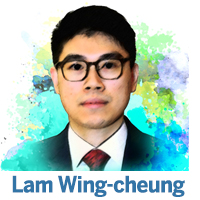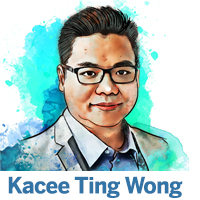According to Peggy Noonan, a columnist for The Wall Street Journal, the irony of modern speeches is that as our ability to disseminate them has exploded, their quality has declined. It bears emphasizing that the speech given by Zheng Yanxiong, director of the Liaison office of the Central People’s Government in the Hong Kong Special Administrative Region at the office’s 2025 Spring Festival reception last Friday is an exception to the above rule.

 Brainstorming Hong Kong with the best advice, Zheng tried his best to help the city sail through a storm whipped up by geopolitical and economic headwinds that look set to continue lashing the city for the foreseeable future. Our think tank is highly confident that Hong Kong can absorb the shocks and sustain long-term prosperity.
Brainstorming Hong Kong with the best advice, Zheng tried his best to help the city sail through a storm whipped up by geopolitical and economic headwinds that look set to continue lashing the city for the foreseeable future. Our think tank is highly confident that Hong Kong can absorb the shocks and sustain long-term prosperity.
Our discussion will focus on Zheng’s five suggestions on sustaining Hong Kong’s success story.
First, Zheng reiterated the emphasis placed by President Xi Jinping on the need to uphold the “one country, two systems” policy in order to sustain Hong Kong’s success story. The formulation of the “one country, two systems” policy can be regarded as one of the epochal chapters in China’s century-long march toward national rejuvenation. Drawing from the deep wells of Chinese wisdom, Xi stressed that the values embodied in the “one country, two systems” policy — namely peace, inclusiveness, openness and sharing — are relevant to not only China but also the whole world. These values should be cherished by us all.
Under the principle of “one country, two systems”, Hong Kong can fully capitalize on national strength, as the process of Chinese modernization presents significant opportunities for the city; it can also fully utilize its institutional advantages, economic positioning, legal framework and rich cultural diversity. Zheng emphasized the need to maintain strong confidence and take proactive steps to fully harness the institutional advantages of “one country, two systems”.
To achieve greater success, Zheng stressed the need for Hong Kong to fully leverage its institutional strengths to enhance its global connectivity. One of the unique institutional strengths is the common law system, which is vital for the economic success of Hong Kong. According to Zheng, we find ourselves at a pivotal moment as our country continues its journey toward national rejuvenation while the world is undergoing changes not seen in a century. These drastic changes and challenges fuel uncertainty in international politics.
Second, Hong Kong must align its economic development with national security. As President Xi has correctly pointed out, we must balance development with security imperatives to ensure that high-quality development and greater security reinforce each other. Zheng also pointed out that the world was not at peace, and Hong Kong could not afford to be complacent. Like Zheng, Hong Kong Bar Association Chairman Victor Dawes emphasized the importance of national security. He dismissed criticism of the courts’ handling of national security-related cases as unfair.
Third, Zheng laid stress on innovation and adaptability to changes. To cite an example of the city’s innovative power, Hong Kong should be very proud of its biomedical sector. He said a landscape filled with changes could offer significant opportunities for the city. With strong support from the motherland, well-established business connections with Western economies, a rising platform fueled by the Global South, and the connections fostered by the Belt and Road Initiative, Hong Kong is well-positioned to succeed and must strive to excel by upholding fundamental principles and breaking new ground.
Fourth, strategic integration with national development has not escaped Zheng’s attention. It is worthy of note that all major cities in the Guangdong-Hong Kong-Macao Greater Bay Area have developed at breathtaking speed in recent years. According to Zheng, Guangzhou, Shenzhen and Hong Kong have their own unique strengths, respectively recognized for holistic development, technological prowess and extensive connections. Hong Kong’s distinctive role as a superconnector will be reinforced as Guangzhou and Shenzhen further tap their respective advantages and foster closer cooperation with the HKSAR.
Fifth, Zheng called on Hong Kong to rise to the challenges, move forward with a strong sense of responsibility, and strive to address obstacles to sustain the city’s success story. In addition to highlighting the five formulae of success, Zheng also tried to boost the morale of Hong Kong residents. Giving a reassuring pat on their shoulders and emphasizing the support given by the central government, Zheng applauded the significant developments made by Hong Kong in various areas. He also highlighted the city’s efforts in upholding social stability through local legislation according to Article 23 of the Basic Law — the enactment of the Safeguarding National Security Ordinance in March.
In a separate speech, Hong Kong Chief Executive John Lee Ka-chiu said that the SAR government will unite various sectors of society to actively pursue reforms aligned with national strategies, thereby creating new opportunities and advantages for economic development. He emphasized plans to enhance Hong Kong’s connectivity by increasing offshore renminbi liquidity and attracting more mainland and international companies to the city. Additionally, the government aims to establish investment and free trade agreements with countries involved in the BRI.
Our think tank is confident that Zheng’s advice and formulae for success will aid Hong Kong in its pursuit of sustainable growth and prosperity, as well as in formulating its development strategies and positioning itself in national development.
Lam Wing Cheung is a member of HKSAR Election Committee, co-director of district administration of the Chinese Dream Think Tank and a district councilor.
Kacee Ting Wong is a barrister, part-time researcher of Shenzhen University Hong Kong and Macao Basic Law Research Center, chairman of Chinese Dream Think Tank and a district councilor.
The views do not necessarily reflect those of China Daily.


